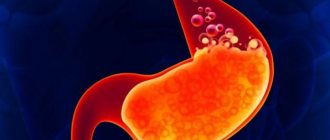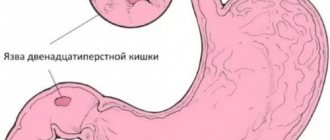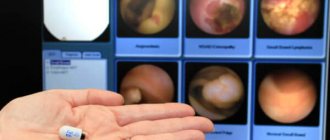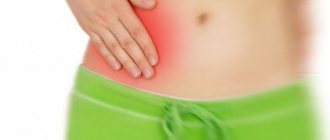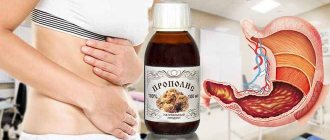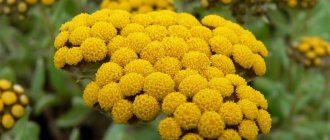Acute gastritis: symptoms
Acute gastritis is an acute inflammation of the gastric mucosa, which occurs with short-term exposure to strong irritants. Acute gastritis occurs suddenly and is severe, often accompanied by the formation of so-called erosions (small defects in the mucous membrane) of the stomach and the development of bleeding. Exacerbation of chronic (already existing gastritis) should be distinguished from acute gastritis.
As a rule, belching, heaviness and sharp pain in the epigastric region, nausea, vomiting, weakness, and dizziness occur. Some patients vomit brown or bloody contents. After 1-2 days, loose stools appear. Most patients had not previously suffered from diseases of the stomach and intestines.
To diagnose acute gastritis, gastroscopy is performed, which is more correctly called esophagogastroduodenoscopy (EGDS). Acute gastritis is usually treated by a gastroenterologist.
First of all, the cause that led to acute gastric injury must be established, and, if possible, eliminated. Sometimes gastric lavage is necessary. During the first day of illness, it is recommended to abstain from eating. You should follow a diet for acute gastritis - mucous soups, jelly, jelly, etc.
For bleeding, intravenous medications are used to reduce the production of hydrochloric acid in the stomach. In addition, agents are prescribed that promote the healing of erosions by forming a protective “film” on their surface - Venter, sucralfate, etc.
You may be interested in: What can you drink for your stomach?
Relevance of the problem
In gastroenterology, gastritis remains one of the most pressing problems today, accounting for more than 80% of the morbidity structure. The main focus is on the chronic form with episodes of exacerbation requiring emergency care. It is the acute development of symptoms that becomes the main reason for patients to consult a doctor, the main reason for which is inflammation. The prolonged course of the disease, if the indicated therapy and diet are not followed, gradually leads to persistent morphological disorders (atrophy).
Unfortunately, in the majority of patients who come to the doctor, FGDS (fibrogastroduodenoscopy) already reveals signs of a long-term disease against the background of an exacerbation.
Thus, acute gastritis can be understood as inflammation that occurs for various reasons, which mainly affects the gastric mucosa, causing pain, vomiting and indigestion.
It is now generally accepted that the changes are not limited only to this area, affecting the initial parts of the duodenum (gastroduodenitis).
Unpleasant symptoms can suddenly disrupt the quality of life of a person of any age. In this case, as a rule, it is quite difficult to establish a single causally significant factor. A special group of patients consists of children and adolescents who necessarily require qualified and timely emergency care.
Acute attack of gastritis
Acute gastritis is a severe inflammation of the gastric mucosa due to the aggressive influence of food, medications, and chemicals on it. Signs of acute gastritis appear within several hours after exposure to an unfavorable factor.
Among the causes of acute gastritis, malnutrition is primarily identified. The main enemies of the stomach are the harmful goodies that we love to pamper ourselves with: carbonated drinks, spicy, salty, fried foods, strong coffee, alcohol. Fasting and overeating also do not benefit the gastric mucosa, as do seasonings with a pronounced taste, such as mustard, vinegar, and pepper.
Acute gastritis can be identified by the following signs: an unpleasant, persistent taste in the mouth, poor appetite, heaviness and pain in the abdomen, nausea, weakness, dizziness, vomiting with an unpleasant odor.
In addition to food, acute gastritis can be caused by smoking, long-term use of strong medications, stomach burns with alkaline and acidic solutions, infectious diseases, mechanical damage as a result of injuries, bruises, severe physical exertion, ingestion of foreign objects, and individual allergies to foods.
There are four types of acute gastritis:
In a situation where acute gastritis develops, urgent hospitalization of the patient is necessary.
- the most common is catarrhal, which usually affects only the surface of the gastric mucosa;
- fibrous gastritis is often a consequence of an infectious disease or poisoning;
- corrosive gastritis affects the deep layers of the stomach walls due to poisoning with chemicals;
- the most dangerous is phlegmanous gastritis, which is accompanied by purulent inflammation of the stomach walls. With such gastritis, there is a high probability of death if the patient does not receive medical assistance within 24 hours.
In a situation where acute gastritis develops, urgent hospitalization of the patient is necessary. First of all, in a medical institution, the patient’s stomach is washed out using a rubber probe. On the first day of hospitalization, absolute hunger is indicated. Cramping pain in the abdominal area and severe diarrhea, signs of an acute attack.
Without the recommendation of doctors, taking any medications, even painkillers, is strictly contraindicated. After all, such an attack is similar in symptoms to food poisoning. However, the treatment methods for these diseases will differ significantly. Therefore, a qualified examination and prescription of medications is necessary, strictly on an individual basis.
It is not worth refusing hospitalization, citing the fact that an attack of acute gastritis may go away on its own. Complications of the disease can lead to the development of erosions or a chronic form. These types of gastritis require longer and more thorough treatment than simple gastritis. Preventive measures include, first of all, eating high-quality food and a healthy lifestyle.
Symptoms of exacerbation of the disease
The chronic form does not have too acute symptoms and is manifested mainly by heartburn and mild nausea after eating. Soreness does not bother me regularly. But during the period of exacerbation and acceleration of development, the disease is accompanied by the following symptoms:
- constant pain appears, which can be either very acute or muffled, worsening on an empty stomach;
- after eating a small amount of food, severe vomiting or nausea begins, which makes the head feel dizzy, the person turns pale and loses strength;
- constant belching and heartburn also appear, and the symptom is characteristic of both gastritis with high and low acidity;
- stool disorders develop - diarrhea or constipation, depending on the form of the disease;
- on the right side there is a constant heaviness, a feeling of fullness.
In acute gastritis, severe irritation of the gastric mucosa occurs due to the production of acids or alkalis.
Important! An exacerbation of chronic gastritis should not be confused with the acute phase of the disease, which develops not as a consequence of a permanent pathology, but as a separate disease as a result of the action of bacteria, drugs or other factors.
With timely treatment, acute gastritis can go away forever without becoming chronic.
Acute exacerbation of gastritis when to consult a doctor
Acute gastritis (acute inflammation of the mucous membrane of the stomach walls) is one of the most common diseases in the practice of gastroenterologists. This is easy to explain if we consider the reasons for the development of this disease.
An acute attack of gastritis can begin even against the background of complete health, if the stomach has been negatively affected under the following circumstances:
- ingestion of excessively rough, hot, cold, spicy foods (especially if such exposure is observed regularly or constantly);
- a course of treatment with medications containing substances that irritate the gastric mucosa (for example, taking aspirin and other NSAIDs);
- bad habits (smoking, alcohol abuse); consumption of low-quality and/or contaminated food, etc.
Regardless of the causes of an attack of acute gastritis, this disease requires immediate diagnosis and treatment.
But regardless of the causes of acute gastritis, this disease requires immediate diagnosis and treatment. Without adequate therapy, this disease can create conditions for ulceration of the mucous membrane and further development of gastric ulcer, or become chronic.
Depending on what factors are causing inflammation of the gastric mucosa or an acute exacerbation of pre-existing gastritis, symptoms can vary widely.
But if you experience more than one of the symptoms described below (in any combination), consult your doctor as soon as possible:
- cutting, paroxysmal pain in the epigastric region;
- severe nausea, attacks of vomiting (half-digested food with traces of mucus, bile or blood);
- increased body temperature, chills; bloating, seething and rumbling in the abdomen;
- loose, recurring stools;
- general feeling of malaise, weakness, dizziness.
It should be remembered that if you delay contacting a doctor, the treatment of acute gastritis can be complicated, as complications of this disease can develop.
Drug therapy
Medicines for gastritis are prescribed by the doctor depending on its form and additional symptoms.
In case of exacerbation of gastritis, medications are taken only under the supervision of a specialist. Elimination of the disease is usually carried out in several directions at once.
A specialist identifies Helicobacter and prescribes antibacterial therapy for this purpose. Only the doctor prescribes the type of medication taken and its dosage, and this is determined by the results of the tests performed.
Features of treatment:
- Most often, during exacerbation of chronic gastritis, the patient is advised to take the following antibiotics: Tetracycline, Clarithromycin, De-Nol. Typically, the course of taking antibacterial agents is 7-14 days.
- When selecting drug therapy, it is necessary to establish the level of acidity and to normalize it, medications can be prescribed whose action is aimed at suppressing the production of hydrochloric acid. This allows you to prevent the formation of ulcers and erosions on the surface of the mucosa, reduce pain and improve the patient’s perception of other medications.
- To reduce acidity during exacerbation of gastritis, the following drugs can be used: Omeprazole, Gastrofarm, Ranitidine.
- In addition, in some cases, taking a hormonal medication such as Cytotect is indicated, which is strictly forbidden to take during pregnancy.
- If the studies revealed a decrease in acidity in the patient, then to normalize its level, medications are prescribed that have a stimulating effect on its production. It is important to remember that such drugs are not allowed to be taken if gastritis occurs in an acute form. To eliminate unpleasant symptoms, the following drugs can be prescribed: Pepsidil, Abomin, Panzinorm.
- The patient can take ready-made gastric juice, which is previously diluted with water. It is recommended to drink this solution in small sips during meals.
- It is possible to get rid of pain during exacerbation of gastritis with the help of Analgin, Papaverine and No-shpa. If the pain becomes simply unbearable, then you are allowed to take the Baralgin tablet. An attack of nausea and vomiting can be eliminated with the help of medications such as Reglan and Cerucal.
- In case of increased acidity with gastritis, antacids are prescribed, the action of which is aimed at enveloping the gastric mucosa and creating obstacles to its destruction by hydrochloric acid. In addition, such medications help reduce the activity of hydrochloric acid, and this results in the elimination of belching and heartburn. The following medications have a good effect: Maalox, Phosphalugel, Almagel, Gastal, Rennie.
- Gastritis often occurs as a result of severe stress and nervous tension, so sedatives may be prescribed. Typically, patients with gastritis are prescribed Novopassit, Neozepam, Relanium, as well as products containing motherwort.
Sometimes gastritis is autoimmune in nature, so to eliminate this disease, hormonal medications are prescribed, the effect of which is aimed at suppressing the immune system. It is possible to select a particular drug only after identifying the nature of the stomach damage.
Diet for illness
It is important to remember that you need to eat food regularly and preferably in small portions.
When gastritis worsens, it is important to eat well, and the diet must be gentle. In the first days of exacerbation of the disease, a strict diet is prescribed, and as the symptoms decrease, the diet is allowed to expand slightly. The choice of one or another nutritional principle is determined by the form of the disease and its type.
If the patient has increased acidity, then special nutrition should be aimed at reducing the production of hydrochloric acid. If atrophic processes predominate, a special diet should be aimed at activating the functioning of the glands. In order to understand how to relieve exacerbation of gastritis with the help of food, it is necessary to pay attention to the peculiarities of the manifestation of such a disease. It should be remembered that for any type of gastritis you should give up smoking, alcoholic beverages, fatty and spicy foods.
Dietary food should not be consumed in isolation, but it is important to use an integrated approach, that is, proper nutrition is supplemented by taking pharmacological medications and folk therapy.
In case of exacerbation of gastritis, it is recommended to alternate meals with drinking water and tea, and the time period should not exceed two hours. In addition, you should avoid combining protein-rich foods with foods that contain high amounts of carbohydrates. It is quite problematic for a weakened stomach to cope with coarse fiber, so it is recommended to consume such food in small quantities.
Typically, carbohydrates are eliminated from the stomach first, followed by proteins, and fats last. It should be remembered that the longer food is present in the human stomach, the more hydrochloric acid will be produced in it.
How to relieve an attack of acute gastritis
Before starting treatment for acute gastritis, experts recommend cleansing the intestines and stomach. In situations with an infectious etiology of gastritis, antibacterial drugs and absorbent substances are prescribed: kaolin, activated carbon and others. Antihistamines have a good effect in acute allergic gastritis. A pronounced pain syndrome requires the use of antispasmodics and anticholinergic drugs.
An attack of acute gastritis can be alleviated by washing the stomach with a solution of baking soda or mineral water.
Proper nutrition is also necessary. In particular, in the first one or two days you need to completely give up food, however, it is not forbidden to drink strong tea. On the second and third days, the patient can indulge in porridge made from semolina and rice, low-fat broth, jelly, and slimy soup. After about ten days, the patient can return to a normal diet.
An attack of acute gastritis can be alleviated by washing the stomach with a solution of baking soda or mineral water. Cleansing the stomach occurs through a special enema or taking a laxative.
It is useful to place a warm heating pad or a warming compress in the stomach area, and then maintain bed rest for two to three days. If the symptoms continue to bother you, you need the help of a specialist - a gastroenterologist. In critical cases, the patient may be admitted to hospital, while in mild cases, outpatient treatment is acceptable. However, even in this case, everything should take place under the strict supervision of a doctor.
When do you need help?
The symptoms of acute gastritis/gastroduodenitis reflect the nature of the causal factor, the duration of its influence and the presence of an adequate response of the body. When chemical compounds are ingested, a person’s condition worsens either immediately or in the coming hours.
The first signs of acute gastritis include the following:
- Decreased appetite, up to its loss;
- Feeling of unpleasant taste in the mouth;
- Feeling of heaviness and/or pain in the upper abdomen of varying intensity;
- Excessive salivation;
- Nausea;
- Vomiting (usually profuse with an unpleasant odor, may contain mucus, bile and pieces of food);
- Heartburn;
- Weakness and dizziness increase, even to the point of loss of consciousness;
- In case of ingestion of food containing pathogenic bacteria, repeated diarrhea, flatulence, and increased body temperature are possible.
The appearance of the patient is also characteristic. An objective examination reveals the following symptoms:
- Pale and dry skin;
- In the oral cavity you can see a thickly coated tongue;
- Flatulence (rumbling, bloating);
- When palpating the upper sections, pain and nausea intensify;
- Daily diuresis decreases.
If a high fever appears (body temperature more than 38.5 degrees), which is accompanied by tremendous chills, vomiting and intense pain against the background of a sharp deterioration in the patient’s general condition, you should immediately call an ambulance. This may indicate the development of phlegmonous (purulent) gastritis, requiring surgical intervention.
If the patient has taken concentrated chemicals, a burning pain begins in the mouth, affecting the pharynx and esophagus. Vomit may contain blood and even pieces of soft tissue. In the first days, death due to painful shock or perforation of the walls of the organ cannot be ruled out. In this case, emergency assistance should be provided as quickly as possible.
How to provide first aid at home during an attack of acute gastritis
Attacks of acute gastritis are characterized by an increase in one or all symptoms at once. To alleviate a person’s condition, it is necessary to call a doctor and provide first aid to the patient before his arrival.
It is necessary to put the patient to bed. Fill a heating pad with hot water and place it on the area of pain – this will relieve the pain a little. Give warm water or warm, but not hot tea to drink. If there are special medications that relieve stomach pain and gently coat the walls of the stomach, then they should be given to the patient according to the instructions. Such drugs are, for example, Maalox or De-Nol.
In case of urgent need, rinse the patient’s stomach. Baking soda dissolved in plenty of water works well for this. If your stool is upset, you should use a laxative or give an enema. Even if after first aid the discomfort subsides and the patient feels much better, a doctor should still be called.
All measures taken only allow you to gain a little time, and do not prevent a serious illness. An attack of acute gastritis is an extremely dangerous condition, in some cases requiring urgent hospitalization of the patient. And the specialist will not only examine and make his diagnosis, but also prescribe the necessary medications.
In case of an acute attack of gastritis, it is necessary to put the patient to bed, fill a heating pad with hot water and place it on the source of pain, so the pain will subside a little
For several days after an attack, the patient needs special care - strict adherence to a diet that involves eating exclusively low-fat soft foods is necessary. Broths and pureed soups, jelly and porridges are good for this. It is best to abstain from eating food altogether for 1-2 days, giving it up in favor of tea and jelly. In addition to special nutrition, it is also necessary to monitor the daily routine, providing the patient with good healthy sleep at least 8 hours a day.
How to provide first aid at home during an attack of acute gastritis for a child
If a child exhibits the same symptoms as an adult, you should immediately call a doctor at home and try to provide first aid yourself.
However, the assistance provided to the child has its own characteristics:
- gastric lavage is done with a solution of 0.5% baking soda, non-carbonated mineral water or clean boiled water;
- a heating pad with warm water is placed on the epigastric region, a warm compress is placed on the stomach;
- The child is advised to drink plenty of warm water, however, during an attack, feeding him is strictly prohibited, this can only aggravate the situation;
- in case of severe pain, you should give an antispasmodic agent - no-shpa (dosage according to instructions) or belladonna tincture (5-10 drops);
- Bed rest after an attack must be observed for 2-3 days, but you can fast only for the first 8-12 hours after the condition worsens.
A child can be hospitalized only in case of a sharp deterioration in the condition - incessant vomiting or severe dehydration. If there is a large loss of fluid, it is urgently necessary to replace it intravenously.
Socal treatment for gastritis
If the exacerbation is not so severe, then help is provided at home. Traditional therapy in this case, as an auxiliary treatment, can significantly improve a person’s condition.
Sokolechenie has long proven itself to be the best. Tubers or plant stems are used to prepare medicinal juices. Freshly squeezed juice should not sit for more than 10 minutes; only fresh plants are used for its preparation.
Before engaging in such self-medication, you should consult your doctor. If the secretory activity of the stomach is increased, then carrot juice is recommended. Take it 3 times a day, ½ cup. It should be taken 30-60 minutes before meals, warm. If the juice is well tolerated, the course of treatment lasts for several months.
Important information: Can you eat mushrooms if you have gastritis?
Hypersecretory gastritis is treated with cabbage juice. You need to start drinking ¼ cup. If there are no changes for the worse, the dose is increased to ½ glass or even a whole glass. Reception is carried out 3-4 times a day. The course lasts 2 months. During this time, the symptoms of gastritis should disappear. But if you feel a deterioration in your condition, diarrhea or bloating begins, then treatment should be stopped immediately.
Potato juice is indicated for high acidity and atrophic gastritis. It has anti-inflammatory, regenerating and analgesic effects. You need to drink ½ glass of juice 1 hour before meals. Not everyone can tolerate the taste of potato juice, so you can add a spoonful of honey to it or mix it with carrot juice.
For inflammation of the stomach with reduced secrecy, it is recommended to take beet juice. The course lasts 2 months. Reception begins with 1 tbsp. l. Gradually the dose is increased to 100-200 ml.
How to properly relieve pain during an attack of acute gastritis
To relieve pain during an attack of acute gastritis, sometimes it is enough to cleanse the stomach - drink a few glasses of warm water or a solution of baking soda and induce vomiting. In more severe cases, the stomach is washed out using a tube in a medical facility.
For dull, debilitating pain, it is recommended to take an antacid (enveloping) drug. No-shpa also helps with gastritis. If the medicine is not at hand, you need to lie on your side for at least 15 minutes, pull your knees to your stomach and lie down. You can press a cold heating pad to your stomach. A decoction of rice will help relieve pain and relieve an attack: boil 1/2 cup of cereal in 1 liter of water and drink warm.
After this procedure, it is important that the inflamed stomach works in a gentle manner. To do this, it is recommended to fast for 1-2 days, drink only unsweetened tea, warm alkaline mineral water, rosehip decoction and observe bed rest.
How to relieve pain during an attack of acute gastritis at home
What needs to be done in order to relieve an acute attack of gastritis inflammation at home? An attack of acute gastritis often requires emergency medical attention.
An attack during inflammation of acute gastritis can be removed by drinking chamomile decoction
However, a person has the opportunity to alleviate the symptoms of an acute attack during inflammation of gastritis by taking conventional folk remedies, for example, a glass of cold milk or chamomile infusion. Potato juice and mint infusion have proven themselves to be excellent during an attack of gastritis.
You can reduce the intensity of pain in the presence of an attack of the above pathological process by taking a horizontal position on your side and pulling both legs towards your stomach. You must remain in this position for 30 minutes.
To quickly relieve a pain attack in the stomach area, it is also recommended to put something cold on the epigastric area. For this purpose, you can make a cold compress with ice cubes and apply it to the above-mentioned area.
After alleviating the patient’s condition during an acute attack of gastritis, on the second or third day, you can eat light, low-fat dishes such as soups, cereals, purees, and jelly. It will be very useful to consume some mineral waters to relieve the pain that accompanies an attack.
You may be interested in: Sorbents for cleansing the body.
Medicinal pain relief during an attack of acute gastritis
In case of a mild attack of acute gastritis, treatment can be carried out using non-prescription medications in the antacid category. These are medications that counteract and neutralize acid, which contributes to the development of inflammatory processes in the gastric mucosa.
In case of a mild attack of acute gastritis, treatment can be carried out using non-prescription medications in the category of antacids
Sold in liquid or tablet forms, these medications can help quickly relieve pain during an attack. If such remedies do not work, you can use acid blockers like Ranitidine and Cimetidine.
Another class of commonly used drugs is known as proton pump inhibitors. They work by binding to enzymes that stimulate parietal cells. These medications significantly facilitate acid production and help relieve pain. Sometimes it is recommended to take antibacterial agents in order to treat the infection that causes inflammation of the stomach.
Gastroenterology experts believe that proton pump inhibitors also inhibit bacterial growth. There is no specific duration of therapy. It all depends on the degree of inflammation and the type of gastritis.
Sources:
https://medportal.ru/enc/gastroenterology/gastritis/3/ https://policlinica.ru/ostryy-gastrit.html https://www.kp.ru/guide/kak-lechit-gastrit.html https: //www.1-clinic.ru/solveproblems/ostryj-pristup-gastrita.html https://mamapedia.com.ua/health/health-mama/ostryi-gastrit.html https://gastritinform.ru/pishhevarenie. com/gastrit/lechenie-gas/pervaya-pomoshh-pri-gastrite-dlya-vzroslyh-i-detej/
Prevention of exacerbations
Prevention of relapses is important: this is the only way to protect the mucous membrane from further destruction and complications of the pathology. Moreover, proper adherence to the rules of prevention helps restore irritated mucous membranes. For chronic superficial gastritis, this approach will help the patient recover completely.
To prevent inflammation, a person must remember:
- About following a balanced diet . It is important not only to eat the right foods and not to eat the wrong foods, but also to adhere to the regime. Eat small portions regularly and in no case allow long gaps between meals. Food should be warm, because cold and too high temperatures provoke inflammation. You also need to remember to use only fresh products.
- On the rational use of drugs . Gastritis is often provoked by uncontrolled use of medications for any reason. Especially such strong ones as antibiotics, glucocorticosteroids, NSAIDs.
- About the rules of personal hygiene . Gastritis in 80% of cases is activated due to the proliferation of Helicobacter pylori. And it comes into action when pathogenic flora enters the body through unwashed fruits and vegetables, expired food, raw meat, as well as dirty cutlery and even clothes.
Gastritis intensifies with decreased immunity and often recurs against the background of other diseases. Therefore, it is important to find foci of infections and inflammations in time and treat them.
Exacerbation of gastritis is a dangerous condition that requires drug treatment and medical consultation. But the patient should know what first aid will help with acute pain and stop the inflammatory process. Indeed, behind the soreness there is often hidden dangerous destruction of the gastric mucosa and atrophy.

